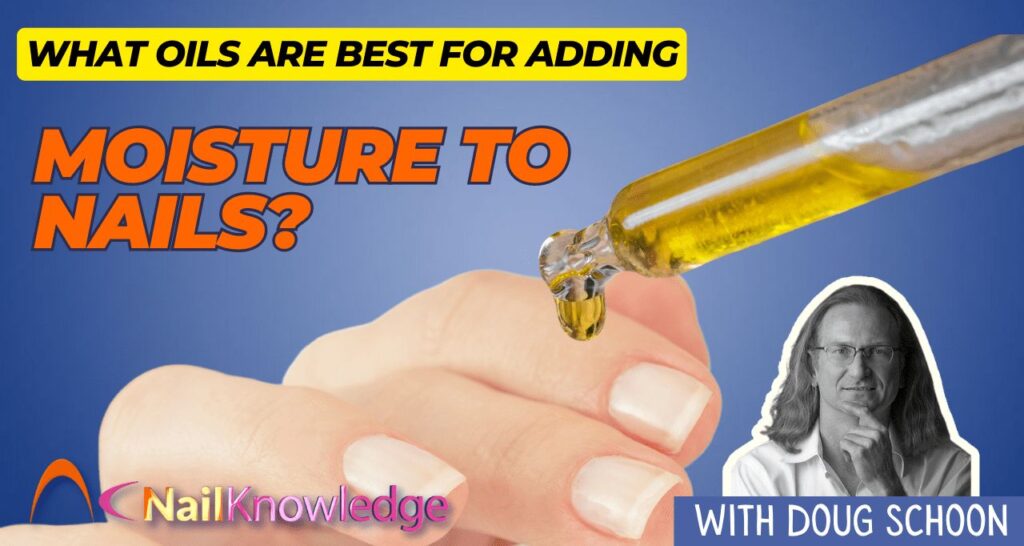Also, are Different Oils Better for Hair or Skin?
Moisturizers are misunderstood. Contrary to what some may believe, oils can’t add any moisture to nails, skin or hair, but they can prevent “dryness”, so this causes some confusion.
The Role of Moisturizing and Water Concentration
When moisturizing is added, that increases “water” concentration inside nails, skin or hair. As you probably already know, water and oil don’t mix.
Anhydrous Nature of Cosmetic Oils and Emulsifiers
The water content of any cosmetic oil is nearly zero. They are considered “anhydrous” or “without water”. Oils and water can exist together in a cosmetic lotion or cream, but only if they are mixed with a special type of ingredient called an “emulsifier”. Emulsifiers are used to create many types of oil and water blends. Many foods, such as salad dressings, mayonnaise and ice cream are all made possible by emulsifiers and without them, these ingredients would quickly separate.
Moisture Content and Creams/Lotions
Creams and lotions can increase the moisture content of nails, skin or hair because they contain significant amounts of water as an ingredient. Oils by themselves can also increase the moisture content of nails and skin, but they do this in a different way than many understand. Oils coat the nails and skin with a thin film that forms a moisture resistant barrier.
Oils and Their Impact on Moisture Content
Some oils can penetrate and will create a barrier in the upper layers of the skin. Underneath this barrier, moisture can build up, thus raising the water content of nails or skin, but not for hair. Why? A steady supply of water travels from the nail bed to the nail plate surface, just as it does from the dermis to the skin’s outer surface.
Water Migration and TEWL
This water migration is slowed down by oils. Water migration through the epidermis is called “trans-epidermal water loss” or TEWL. Cosmetic scientists use special instruments to measure the TEWL to determine the effectiveness of skin lotions, creams and oils. Lower water loss (less water escaping from the skin) means a product is a more effective moisturizer.
Oils’ Effects on Nails, Skin, and Hair
This type of water migration doesn’t occur in a shaft of hair, so oils can’t moisturize the hair. Some oils provide additional benefits by increasing the flexibility in nails, skin or hair. As I explained in a previous question, nail oils add lubrication which allows the various layers to slide across each other, increasing flexibility. Oils also soften each of these to make their surfaces less hard. Some don’t penetrate at all, and remain on top of the skin. Those that sit on top of the skin are called “occlusive agents”.
Occlusive Agents and Moisture Retention
That term may sound like something out of a spy thriller, but the word “occlude” simply means “to block” or “obstruct”. Mineral oil is an “occlusive agent” which means it doesn’t penetrate; instead, it will sit on the skin to create a barrier that slows or blocks moisture evaporation.
Silicone oils can be occlusive agents as well.
Moisture Build-Up and Skin Plumping
The same type of moisture build-up would occur if you wrapped the skin in plastic wraps that keep foods fresh in the refrigerator. Occluding the skin causes moisture build-up, but we wouldn’t think of these plastic wraps as a skin moisturizer, even though they increase the level of moisture in the skin.
Increased water content can also function to soften and improve skin flexibility and can also cause plumping. Of course, the same happens in the nail plate, but to a lesser degree and the reverse happens as well.
Oils and Blocking Excessive Water Penetration
Oils can also block the penetration of excessive amounts of water from the outside into nails, hair or skin and keep them from becoming over-saturated with water molecules.
Conclusion
Understanding the role of oils in moisturization is crucial for maintaining healthy nails, skin, and hair. While oils themselves cannot add moisture, they play a significant role in preventing dryness by creating a protective barrier. Oils differ in their ability to penetrate and create barriers, with some oils offering additional benefits like increased flexibility.
It’s important to note that water and oil do not mix, and the water content of cosmetic oils is minimal. Creams and lotions, on the other hand, contain significant amounts of water, making them effective at increasing moisture content.
Furthermore, the concept of occlusive agents, such as mineral oil and silicone oils, should be understood. These agents form a barrier on the skin’s surface, slowing down moisture evaporation and enhancing softness and plumping effects. However, they should not be mistaken for traditional moisturizers.
By grasping the distinctions between oils, creams, and occlusive agents, we can make informed choices about the best products to support our nail, skin, and hair health. Remember to consider the unique properties of each and choose accordingly to maintain optimal moisture levels and overall well-being.
FAQs
- Can oils add moisture to nails, skin, or hair?
No, oils cannot add moisture to nails, skin, or hair. However, they can prevent dryness by forming a barrier that retains moisture. - Can different oils have varying effects on the skin compared to hair?
Yes, different oils can have varying effects on the skin compared to hair. While oils can increase moisture content and provide benefits for nails and skin, they do not have the same moisturizing effect on hair. - What are occlusive agents, and how do they impact moisture retention?
Occlusive agents are substances that create a barrier on the skin’s surface, preventing moisture evaporation. Examples include mineral oil and silicone oils. They can help retain moisture and improve skin flexibility, but they should not be confused with traditional skin moisturizers.


